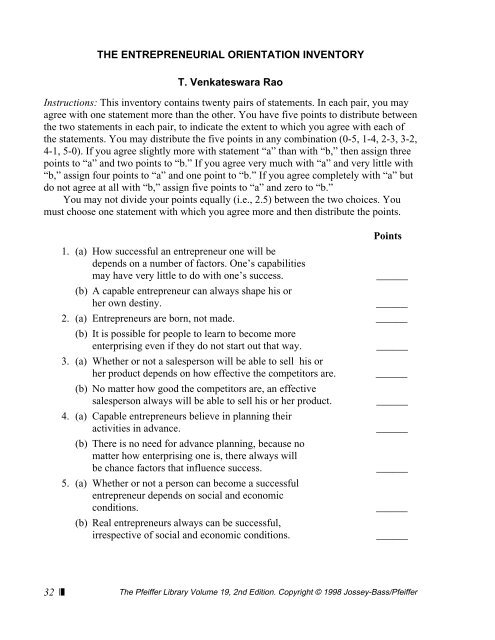motivational analysis of organizations
motivational analysis of organizations
motivational analysis of organizations
Create successful ePaper yourself
Turn your PDF publications into a flip-book with our unique Google optimized e-Paper software.
32 ❘❚<br />
THE ENTREPRENEURIAL ORIENTATION INVENTORY<br />
T. Venkateswara Rao<br />
Instructions: This inventory contains twenty pairs <strong>of</strong> statements. In each pair, you may<br />
agree with one statement more than the other. You have five points to distribute between<br />
the two statements in each pair, to indicate the extent to which you agree with each <strong>of</strong><br />
the statements. You may distribute the five points in any combination (0-5, 1-4, 2-3, 3-2,<br />
4-1, 5-0). If you agree slightly more with statement “a” than with “b,” then assign three<br />
points to “a” and two points to “b.” If you agree very much with “a” and very little with<br />
“b,” assign four points to “a” and one point to “b.” If you agree completely with “a” but<br />
do not agree at all with “b,” assign five points to “a” and zero to “b.”<br />
You may not divide your points equally (i.e., 2.5) between the two choices. You<br />
must choose one statement with which you agree more and then distribute the points.<br />
Points<br />
1. (a) How successful an entrepreneur one will be<br />
depends on a number <strong>of</strong> factors. One’s capabilities<br />
may have very little to do with one’s success. ______<br />
(b) A capable entrepreneur can always shape his or<br />
her own destiny. ______<br />
2. (a) Entrepreneurs are born, not made. ______<br />
(b) It is possible for people to learn to become more<br />
enterprising even if they do not start out that way. ______<br />
3. (a) Whether or not a salesperson will be able to sell his or<br />
her product depends on how effective the competitors are. ______<br />
(b) No matter how good the competitors are, an effective<br />
salesperson always will be able to sell his or her product. ______<br />
4. (a) Capable entrepreneurs believe in planning their<br />
activities in advance. ______<br />
(b) There is no need for advance planning, because no<br />
matter how enterprising one is, there always will<br />
be chance factors that influence success. ______<br />
5. (a) Whether or not a person can become a successful<br />
entrepreneur depends on social and economic<br />
conditions. ______<br />
(b) Real entrepreneurs always can be successful,<br />
irrespective <strong>of</strong> social and economic conditions. ______<br />
The Pfeiffer Library Volume 19, 2nd Edition. Copyright © 1998 Jossey-Bass/Pfeiffer

















